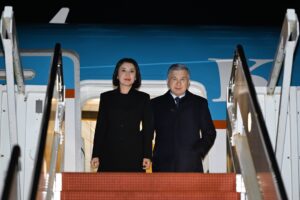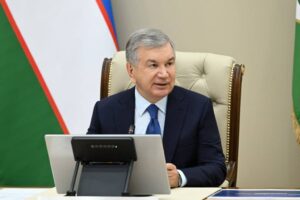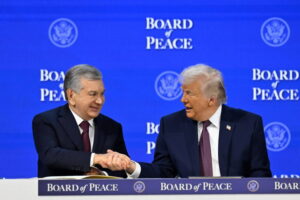President of Uzbekistan chairs a meeting on the development of agriculture

Tashkent, The Gulf Observer: President Shavkat Mirziyoyev chaired a meeting Thursday on measures to increase food production and effectively organize the spring sowing season.
Food supply is one of the most important factors in the well-being of the population and in curbing inflation. In recent years, 200 thousand hectares have been allocated for the cultivation of food crops and an additional 500 thousand hectares of land have been put into circulation, which helps maintain price stability in the domestic market.
To ensure the prosperity of the population, by the decree of the Head of state, 35 types of food products are exempted from import duties until January 1, 2024. In addition, persons included in the social register will receive a refund of value-added tax when purchasing meat from cattle, sheep and poultry, eggs and vegetable oil. It will help more than 2 million families.
Over the past two years, food inflation in the world has been fixed at a level of at least 15-20 percent per year. Prices for vegetable oil, milk and meat have risen to their highest levels in 30 years. Rising prices for transportation, fertilizers and fuel also affect the cost of food.
According to the analysis, this situation will continue both in 2023 and in the coming years. Therefore, it is necessary to find additional opportunities to increase food production and provide employment for people.
In this regard, the opportunities available in the regions were analyzed, and measures for their implementation were defined.
“All conditions have been created for the procurement of food products. From now on, the allocation of additional land is impossible. Now it is necessary to increase productivity, using science and effective technologies, increasing labor productivity”, Shavkat Mirziyoyev said.
The allocation of concessional loans last year, direct financing of the purchase of seeds, seedlings, fertilizers and finished products had a positive effect on food production. This year, 6.2 trillion soums will be allocated for these purposes.
In particular, 700 billion soums will be allocated from the Agricultural Fund to replenish the working capital of horticultural entities.
The Ministry of Agriculture will allocate US$130 million directly to entrepreneurs. To do this, entrepreneurs will submit their projects for consideration through the transparent electronic platform of the ministry. 80 percent of the loan amount can be repaid in installments within 10 years. The loan will be more accessible due to the absence of a bank surcharge.
It was also noted that US$200 million attracted from JICA will be allocated for the production and processing of food products.
The need for the effective use of these funds and the creation of new gardens was emphasized.
Opportunities for the industrialization of agriculture and employment of the population were also noted. For example, mulberry cocoons are a profitable product, the harvesting process of which takes only a month. However, the possibilities of sericulture in some areas are not used to the full extent.
In this regard, the task was set to create sericulture clusters by developing rain-fed and pasture lands located near settlements. Based on the Vietnamese experience, these lands of 1-2 hectares will be provided to the population for planting both mulberry trees and food crops. As a result, it will be possible to provide income for 2 million people and increase the export of the industry by US$600 million.
Another unused resource is land around fields and drainage networks. It was noted that empty land of this type can be leased to farm workers and socially vulnerable families.
The issue of providing agriculture with machinery was also discussed at the meeting.
Today, clusters and farmers have formed a demand for almost 11 thousand machines and units. Therefore, from April 1, a 15 percent subsidy will be provided for the purchase of all types of agricultural machinery for domestic production. Imported equipment is exempt from paying customs duties and disposal fees for three years, and a deferment of payment of value-added tax will be allowed. For the purchase of equipment, loans will be issued at 10 percent per annum for 10 years.
The Ministry of Investments, Industry and Trade has been tasked with expanding the implementation of projects that provide for the production in the country of 25 types of food products with the largest share in imports. Instructions were given on creating favorable conditions for farmers and entrepreneurs using various economic instruments.
The reports of the heads of industries, regions and entrepreneurs were heard on the issues discussed at the meeting.


